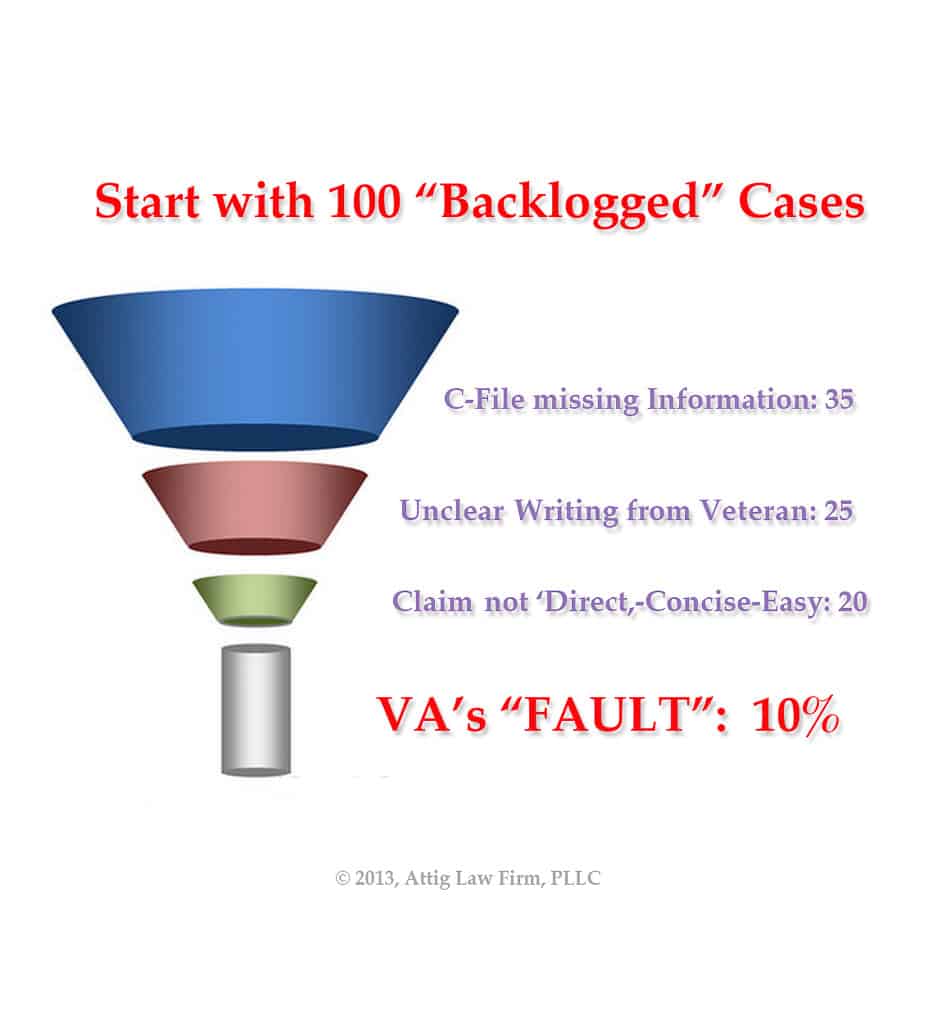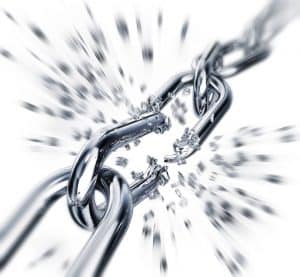Edward R. Murrow – the famous American journalist – once famously said that “We are all prisoners of our own experience”. He was talking about prejudice, and his belief that most men and women cannot overcome or change their prejudices, I think his quote applies our perspective on VA Claims, and the VA Claims process.
All of the myths about the VA Claim process – and the various people in the process – are like bricks. If you stack enough of those myths up, you get a wall – a prison wall.
And when you are surrounding by those myths – and by the people that continually perpetuate them – it is hard to break free from that prison.
When it comes to our thoughts about the VA, and how our VA claim is processed, I believe that we CAN overcome or change how we think about the VA and the Claim Process.
I’m not saying to run out and put an “I-Heart-the-VA” bumper sticker on your car.
That would be a form of Stockholm Syndrome.
I’m talking about making an admission that you have “drank the Kool-Aid” and bought into the myths that built your prison wall. An admission that as a result of accepting those myths, you have become a prisoner in the VA’s Process.
And if you are one of the folks perpetuating those myths, you are imprisoning other Veterans.
The Prison of Bad VA Experiences.
Yes, Veterans experience a VA that delays for an eternity.
The VA repeatedly screws up the facts or law of their case.
And yes, documents are lost or misplaced at the VA Regional Office (frankly, a lot less since the VA has realized that the Regional Office system is inefficient and has centralized the mail process), and the BVA issues decisions based on facts from other case files.
I’m not talking about frustration. I’m talking about the gripes by Veterans:
* You just have to wait to get a decision
* Your VSO will take care of you
* Don’t ever hire an attorney – they are just after your money.
* It’s easy to win a claim – just send all your medical records to the VA and let them figure it out.
* The whole VA needs to be gutted
You get the picture – you have heard these gripes and complaints and suggestions, and you know in your gut that they don’t get you anywhere.
These gripes may be true – I’m increasingly finding it hard to believe that there is any “fix” to the VA other than a giant wrecking ball – but do they GET you anywhere?
Consider the empowerment that comes, however, with the opposite feelings:
You DON’T have to wait on the VA all the time.
Your VSO could sometimes care less about you.
Attorneys that represent Veterans are more often than not true-believers trying to change the law.
You should develop your own VA Claim – and never leave it to the VA to decipher your evidence.
And there ARE good people in the VA.
But we complain because it is easier.
It’s a lot harder to do the leg work to develop our claims than to hire a crappy VSO and gripe about being done wrong later.
It’s a lot easier to say the whole system needs to be gutted than to take care that our one piece of the system works well.
It’s a lot easier to think attorneys are money-grubbers out for our money than to sit down and do the legwork to choose the one that is right for us – and best for “my” claim.
But if you want to Change the Way You Experience the VA Claims Process, you have to Change the Way YOU Experience the VA Claims Process.
How to Break Free from that Prison.
My goal on the Veterans Law Blog is to teach you how to break free of that prison.
It’s not something that is going to happen overnight – as someone much smarter than me once said, “We are writing a Russian novel, not a short story”.
But I believe that if you are willing to take ownership of your piece of the VA disability compensation mess – your one single claim or appeal – you have unleashed more Power to Change How You Experience the VA Claims Process than you know.
What does “taking ownership of your piece of the VA Disability puzzle” mean, though?
And by saying this, am I not implicitly saying that Veterans are to blame for the problems?
Ownership is not blame. The one has nothing to do with the other.
Ownership is taking charge of the situation regardless who is to blame. Want to spit venom at Congress for not passing an effective Veterans Benefits law in years?
Hey, I’m right there with you: Congress is like nipples on a man – we’d look weird without ’em, but they are largely useless.
But taking ownership of your claim means admitting that – until the day there is PAC Money in it for Congress – Congress isn’t going to do sh**t to help. Want to lash out at the VA and their repeated bouts of incompetence?
The frauds and breaches of the public trust that have occurred in the last 3 months alone – cooking the books at the Philadelphia Regional Office, alteration of dates on claims in the Little Rock Regional Office, Benefits Manipulation at the Hawaii Regional Office, the “Disappearing” of over 18,000 Veterans Claims Files at the Oakland Regional Office…well, it’s enough to make you think it’s easier to throw in the towel.
But taking ownership of your VA claim means believing that there is one good person inside the VA that is willing to help you with your claim, and it is your job to do everything you can to find that person.
No matter how friendly and polite you have to be.
No matter how much leg-work you have to do.
Want to rant about how the Veterans Court refuses to stand up to the VA and enables the very problems the Court was created to fix?
Hey, I won’t necessarily correct you – the Court has perpetuated horrible attitudes about the Veterans Bar. It has stretched the boundaries of logic and reason and justice and leaves us grappling to understand not just the logic underpinnings of a good number of outcomes in the matters before it, but why it exists in the first place.
But does it get you anywhere?
No. Complaining gets you nowhere.
What gets you somewhere?
Taking ownership of your VA Claim, making sure that you understand the Court process and stand your ground if you believe your interpretation of the law is the right interpretation.
More on Owning Our VA Claims/Appeals.

I’ve represented many Veterans before the VA, and looked at hundreds (if not thousands) of Veterans Claims Files.
We – Veterans – own the delays in our claims/appeals.
Many of you will look to the image above and think I’m “dissing” on Veterans.
Blaming them.
Not at all. That’s what the VA does – like a petulant little narcissist, the VA blames Veterans for its problems.
What I am saying is that if we take ownership of the delays in the process, we can FIX the delays in the process.
But admitting we have been imprisoned by the myths of decades past, we can overcome those myths and break free from the prison of our VA Claims experiences.
Here are a few ways that you can start breaking free from that prison – right now:
1. Know what is – and what is not – in your C-File.
The C-File is the single most important document in a Veterans case, in my opinion.
Do you have a recent copy of your C-File?
Have you analyzed the file from the VA’s Perspective?
If not, why not? If you are going to OWN your VA Claim, you darn sure need to know WHAT you own, right.
Check out the VA C-File Field Manual – get your C-File. See the mess that the VA has made of it – then make a commitment to doing what is necessary to get it fixed.
2. Getting a solid handle on the law that applies to our cases.
Sun Tzu, in his treatise The Art of War , famously said: “If you know yourself and your enemy, you will not lose in 100 battles”.
Many of the files I look at show that Veterans “think” they understand the law that applies to their case.
This is the prison of experience that Murrow talks about.
This is why these Veterans face long delays and unsatisfactory results. They may know the VA, but they do not know the weaknesses of their own case.
When we see our claim/appeal as the VA sees it, flaws and all, only then can we begin to change the way we experience the VA Claims Process.
By following this blog – and other blogs that I frequently link to and share – you can learn a different way of seeing your claim: the way the VA sees it.
3. Improving Your Writing – Learn to Be More Persuasive.
I don’t expect you to write like a lawyer – frankly, I try not to write this way either.
There is nothing less than persuasive than writing – or trying to write – in your VA claim the way a Judge might write a legal opinion.
That sort of writing is cold and mathematical, and refuses to take account of human emotion.
No, I want you to write more persuasively. More simply. More cleanly.
I want to teach you 5 – simple – editing tips you could follow in under 10 minutes that would dramatically increase your ability to write persuasively?
I want to teach you to organize your writing so that the VA better understands your arguments – and WANTS to write a decision in your claim?
4. Develop Your Own VA Claim.
Don’t let anyone else – not a VSO, not the VA, not an attorney – develop your claim for you until you know exactly how to develop the claim yourself. Learn how to “Watch the Watcher” in your claim.
Or, learn how to do it yourself, apply some good old-fashioned “elbow-grease”, or what one blogger calls “Grit”, and get to it.
Remember, the “secret recipe” at the VA is “Direct. Concise. Easy”.
When a claim/appeal has all 3 of those elements, then the VA typically wants – and is able – to move much more quickly.
Is your VA claim “Direct, Concise, and Easy”?
Conclusion.
If you are ready to Change the Way that YOU Experience the VA Claims Process, then the first thing we must do is break you out of the Prison of your Own Experience.
Sit down and ask yourself: How has your Experience with the VA become your Prison?
Then honestly answer that question, and commit to doing what needs to be done to make a Change.







THIS IS A BRILLIANT POSTING. KUDOS AND MORE KUDOS SIR. YOU UNDERSTAND COMMUNICATIONS!
Glad it helped!
–C